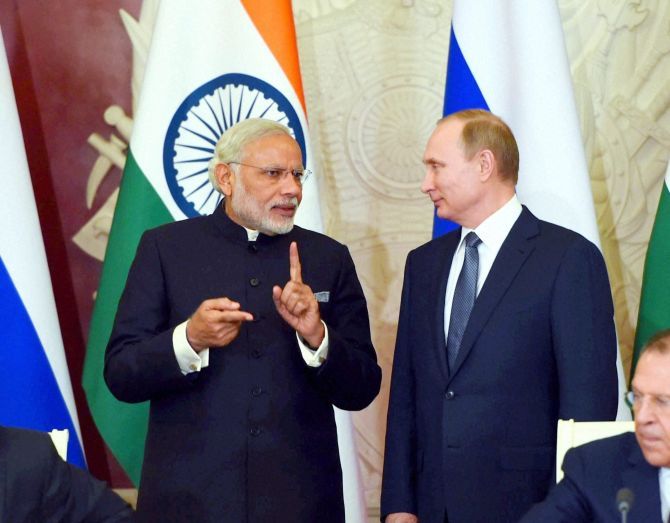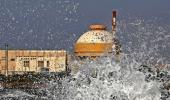In a major push to their strategic ties, India and Russia on Thursday decided to expand cooperation in various sectors as they signed 16 pacts, including on joint manufacture of 226 military helicopters and construction of 12 atomic plants with involvement of local companies in India.

After extensive talks with Russian President Vladimir Putin, Prime Minister Narendra Modi underlined the need for the world to unite against terrorism "without distinction and discrimation between terrorist groups and target countries", an apparent reference to sources of the menace like Pakistan.
Sharing concern over terrorism, the two sides pressed for joint fight against the global menace "without selectivity and double standards", said a joint statement issued after the talks between the two leaders.
Putin conveyed Russia's "strong support" to India's bid for permanent membership of the UN Security Council, saying it is a "deserving and strong candidate that can bring an independent and responsible approach" within the world body.
The discussions covered a wide range of issues including terrorism, cooperation in the fields of defence, security and energy and ways to enhance trade and investment besides facilitating easier movement of people.
After the talks, the two sides signed 16 agreements.
One of these was an agreement on manufacture of Kamov 226 helicopter in India, which, the prime minister, said is the first project for a major defence platform under 'Make-in-India' programme.
With regard to nuclear energy, Modi said the pace of cooperation is increasing and progress is being made on 12 Russian reactors at two sites in India.
Putin said Unit-II of Kudankulam atomic plant in Tamil Nadu, being built by Russia, will be commissioned within weeks and negotiations are at an advanced staged for Unit III and IV.
In the atomic field, the two sides signed a significant agreement for "Localization of Manufacturing in India for Russian-Designed Nuclear Reactor Units" to enable participation of Indian firms under the 'Make-in-India' programme.
Affirming that their cooperation in the peaceful uses of nuclear energy is a cornerstone of the Russia-India strategic partnership, the two leaders appreciated the progress made in the Kudankulam Nuclear Power Project and agreed to expedite the implementation of ongoing and upcoming projects there.
"The sides welcomed progress in identifying the second site in India for additional six nuclear reactor units to be set up in cooperation with Russia," said the Joint Statement titled 'Shared Trust, New Horizons'.
In the joint press statement with Putin, Modi said, "The pace of our cooperation in nuclear energy is increasing. We are making progress on our plans for 12 Russian nuclear reactors at two sites.
"The agreement today will increase Indian manufacturing content in these reactors. It supports my mission of Make in India. I thank President Putin for his support."
With regard to the defence cooperation, the prime minister said the Inter-Governmental Agreement on manufacture of Kamov 226 helicopter in India is the first project for a major defence platform under the 'Make-in-India' mission. "It is rightly with our most important defence partner," he added.
"We have made progress on a number of other defence proposals. These would boost defence manufacturing in India and India's defence readiness with next generation equipment," Modi said.
Summing up his talks with Putin, he said, "we have laid the foundation of the future character of this strategic partnership."
Hailing Putin, Modi said in a changing world, his leadership has kept the bilateral relations on a steady course of progress and growth.
"As I look to the future, I see Russia as a significant partner in India's economic transformation and in shaping a balanced, stable, inclusive and a multi-polar world," he said.
The two sides expressed commitment to realize the target of USD 30 billion in 10 years set at the last Annual Summit, up from USD 10 billion, with Modi saying "we are moving forward on the India-Eurasian Economic Union Free Trade Agreement".
Modi, who along with Putin, addressed the top business leaders of the two countries before the press interaction, said private sector is also being encouraged to connect with each other more.
"The agreements and the announcements today give me confidence that we will see huge increase in investments and trade in both directions," he said.
The Joint Statement said the two countries vowed to increase annual bilateral trade and investment and emphasized the need for continued facilitation by both the governments as well as speedy implementation of decisions and liberalization of relevant rules and regulations.
In this context, they welcomed the agreement reached on liberalization of the travel regime for the businessmen of both the countries and called for its effective implementation.
The two leaders also instructed relevant agencies to continue the process of modernization of their bilateral investment agreement, it said.
Referring to hydrocarbons, Modi said Russia, one of the world's largest reserves, can be a critical source of energy security for India, especially because of the strategic partnership.
"With President Putin's support, we are enlarging Indian investments in Russian hydrocarbon sector," he said.
"President Putin and I are moving creatively in expanding our economic relations. Following our last Summit, India has created a special notified zone to facilitate direct trade between the world's largest uncut diamond exporter, Russia, and India, which processes 90 per cent of the world's uncut diamond," he said.
Modi told Putin that he has always had great respect and appreciation for the bilateral strategic partnership which "has been a source of strength and success for India in defence, development and diplomacy. And, there is genuine goodwill and mutual respect between our people."
He said he had excellent conversations over the past two days and very productive outcomes. "It has deepened my conviction that this relationship truly meets the test of a special and privileged strategic partnership."
The pacts signed between the two sides also covered various other sectors like hydrocarbon exploration, railways, solar power, customs, space and easing of travel.
Describing India as a "great power" carrying out a balanced and responsible foreign policy, Putin said Russia would like to see India's greater role in addressing global and regional issues.
"We believe that India is a great power that conducts a balanced and responsible foreign policy and is one of the most worthy candidates for taking the seat of a permanent member on the UN Security Council," Putin said.
He underlined the importance for the two countries to make "similar approaches to key international problems".
He noted that both the countries are for a political settlement of the conflict in Syria and promotion of national reconciliation in Afghanistan.
"We are certain that it is in the interest of the world community to form a wide anti-terrorist coalition operating on the basis of international law and under the auspices of the United Nations," Putin said.
He recalled that Moscow had "strongly supported India's accession to the Shanghai Cooperation Organization and that the two countries were actively cooperating within the BRICS group (Brazil, Russia, India, China and South Africa), where India will take the rotating presidency in February 2016.
At the outset, Modi expressed deepest condolences on the loss of lives in the terrorist attack on a civilian Russian aircraft and in the "unfortunate" downing of the military jet in Syria some time back.
"In this moment of grief and challenge, we stand in solidarity with the people of Russia," the prime minister told Putin.











 © 2025
© 2025